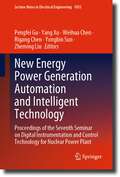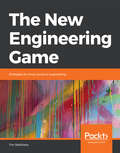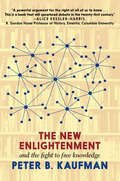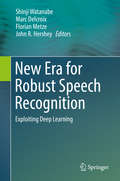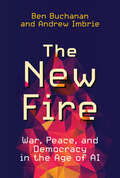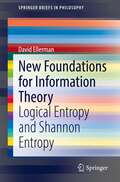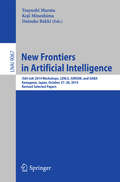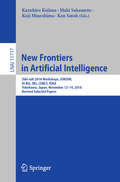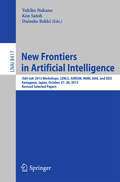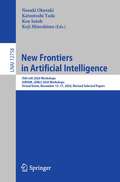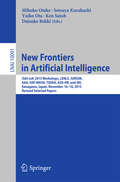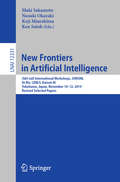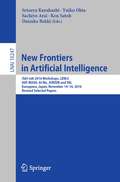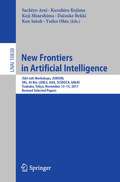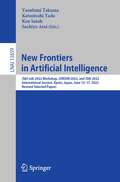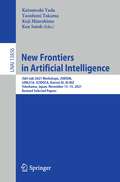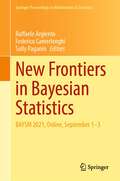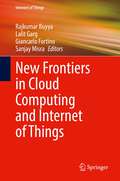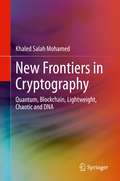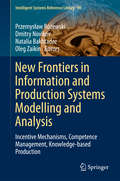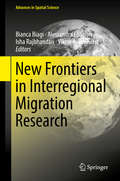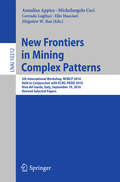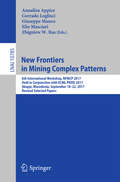- Table View
- List View
New Energy Power Generation Automation and Intelligent Technology: Proceedings of the Seventh Seminar on Digital Instrumentation and Control Technology for Nuclear Power Plant (Lecture Notes in Electrical Engineering #1055)
by Pengfei Gu Yang Xu Weihua Chen Rigang Chen Yongbin Sun Zheming LiuThis book is a compilation of selected papers from the Seventh Symposium on Digital Instrumentation and Control Technology for Nuclear Power Plant, held online on January 11, 2023. The purpose of this symposium is to discuss inspection, test, certification and research for the software and hardware of Instrumentation and Control (I&C) systems in nuclear power plants (NPP), such as sensors, actuators and control system. It provides a platform of technical exchange and experience sharing for those broad masses of experts and scholars and nuclear power practitioners. At the same time, it also provides a platform for the combination of production, teaching and research in universities and enterprises to promote the safe development of nuclear power plant. Readers will encounter new ideas for realizing a more efficient and safer instrumentation and control system.
The New Engineering Game: Strategies for smart product engineering
by Tim WeilkiensAdapt to a world of digitalization and get ready to become a successful player in the new engineering game Key Features • Discover what the fourth industrial revolution is all about • Explore the new engineering game through the context of globalization, craftsmanship, and interdisciplinary engineering • Develop strategies to improve the engineering of products with functional architecture, lean systems engineering, and more Book Description Organizations today face an increasingly complex and dynamic environment, whatever their market. This change requires new systems that are built on the foundation of a new kind of engineering and thinking. The New Engineering Game closes the gap between high-level reflections about digitalization and daily engineering methods and tools. The book begins by describing the first three industrial revolutions and their consequences, and by predicting the fourth industrial revolution. Considering the fourth industrial revolution, it explains the need for a new kind of engineering. The later chapters of the book provide valuable principles, patterns, methods, and tools that engineering organizations can learn and use to succeed on the playfield of digitalization. By the end of the book, you'll have all the information you need to understand the various concepts to take your first steps towards the world of digitalization. What you will learn • Deal with the challenges of Conway's Law • Explore domains from different viewpoints with the Cynefin framework • Use the Business Model Canvas (BMC) to view your business model in one chart • Use the Business Model Navigator (BMN) to elaborate your business model • Get an overview of REThink 4.0 • Discover how to apply the principles of the Agile Manifesto for Software Development in your projects Who this book is for This book is for those of you who want to want to gear up for the ever-evolving and dynamic environment that has come into play with digitalization. Anyone who wants to create industry-grade applications using smart product engineering techniques will find this book useful. To grasp all that has been explained in this book, all you need is a knowledge-seeking attitude.
The New Enlightenment and the Fight to Free Knowledge
by Peter B. KaufmanHow do we create a universe of truthful and verifiable information, available to everyone?In The New Enlightenment and the Fight to Free Knowledge, MIT Open Learning&’s Peter B. Kaufman describes the powerful forces that have purposely crippled our efforts to share knowledge widely and freely.Popes and their inquisitors, emperors and their hangmen, commissars and their secret police—throughout history, all have sought to stanch the free flow of information. Kaufman writes of times when the Bible could not be translated—you&’d be burned for trying; when dictionaries and encyclopedias were forbidden; when literature and science and history books were trashed and pulped—sometimes along with their authors; and when efforts to develop public television and radio networks were quashed by private industry.In the 21st century, the enemies of free thought have taken on new and different guises—giant corporate behemoths, sprawling national security agencies, gutted regulatory commissions. Bereft of any real moral compass or sense of social responsibility, their work to surveil and control us are no less nefarious than their 16th- and 18th- and 20th- century predecessors. They are all part of what Kaufman calls the Monsterverse.The New Enlightenment and the Fight to Free Knowledge maps out the opportunities to mobilize for the fight ahead of us. With the Internet and other means of media production and distribution—video especially—at hand, knowledge institutions like universities, libraries, museums, and archives have a special responsibility now to counter misinformation, disinformation, and fake news—and especially efforts to control the free flow of information. A film and video producer and former book publisher, Kaufman begins to draft a new social contract for our networked video age. He draws his inspiration from those who fought tooth and nail against earlier incarnations of the Monsterverse—including William Tyndale in the 16th century; Denis Diderot in the 18th; untold numbers of Soviet and Central and East European dissidents in the 20th—many of whom paid the ultimate price. Their successors? Advocates of free knowledge like Aaron Swartz, of free software like Richard Stallman, of an enlightened public television and radio network like James Killian, of a freer Internet like Tim Berners-Lee, of fuller rights and freedoms like Edward Snowden. All have been striving to secure for us a better world, marked by the right balance between state, society, and private gain. The concluding section of the book, its largest piece, builds on their work, drawing up a progressive agenda for how today&’s free thinkers can band together now to fight and win. With everything shut and everyone going online, The New Enlightenment and the Fight to Free Knowledge is a rousing call to action that expands the definition of what it means to be a citizen in the 21st century.
New Era for Robust Speech Recognition
by Shinji Watanabe Marc Delcroix Florian Metze John R. HersheyThis book covers the state-of-the-art in deep neural-network-based methods for noise robustness in distant speech recognition applications. It provides insights and detailed descriptions of some of the new concepts and key technologies in the field, including novel architectures for speech enhancement, microphone arrays, robust features, acoustic model adaptation, training data augmentation, and training criteria. The contributed chapters also include descriptions of real-world applications, benchmark tools and datasets widely used in the field. This book is intended for researchers and practitioners working in the field of speech processing and recognition who are interested in the latest deep learning techniques for noise robustness. It will also be of interest to graduate students in electrical engineering or computer science, who will find it a useful guide to this field of research.
The New Fire: War, Peace, and Democracy in the Age of AI
by Ben Buchanan Andrew ImbrieAI is revolutionizing the world. Here&’s how democracies can come out on top.Artificial intelligence is revolutionizing the modern world. It is ubiquitous—in our homes and offices, in the present and most certainly in the future. Today, we encounter AI as our distant ancestors once encountered fire. If we manage AI well, it will become a force for good, lighting the way to many transformative inventions. If we deploy it thoughtlessly, it will advance beyond our control. If we wield it for destruction, it will fan the flames of a new kind of war, one that holds democracy in the balance. As AI policy experts Ben Buchanan and Andrew Imbrie show in The New Fire, few choices are more urgent—or more fascinating—than how we harness this technology and for what purpose. The new fire has three sparks: data, algorithms, and computing power. These components fuel viral disinformation campaigns, new hacking tools, and military weapons that once seemed like science fiction. To autocrats, AI offers the prospect of centralized control at home and asymmetric advantages in combat. It is easy to assume that democracies, bound by ethical constraints and disjointed in their approach, will be unable to keep up. But such a dystopia is hardly preordained. Combining an incisive understanding of technology with shrewd geopolitical analysis, Buchanan and Imbrie show how AI can work for democracy. With the right approach, technology need not favor tyranny.
New Foundations for Information Theory: Logical Entropy and Shannon Entropy (SpringerBriefs in Philosophy)
by David EllermanThis monograph offers a new foundation for information theory that is based on the notion of information-as-distinctions, being directly measured by logical entropy, and on the re-quantification as Shannon entropy, which is the fundamental concept for the theory of coding and communications.Information is based on distinctions, differences, distinguishability, and diversity. Information sets are defined that express the distinctions made by a partition, e.g., the inverse-image of a random variable so they represent the pre-probability notion of information. Then logical entropy is a probability measure on the information sets, the probability that on two independent trials, a distinction or “dit” of the partition will be obtained. The formula for logical entropy is a new derivation of an old formula that goes back to the early twentieth century and has been re-derived many times in different contexts. As a probability measure, all the compound notions of joint, conditional, and mutual logical entropy are immediate. The Shannon entropy (which is not defined as a measure in the sense of measure theory) and its compound notions are then derived from a non-linear dit-to-bit transform that re-quantifies the distinctions of a random variable in terms of bits—so the Shannon entropy is the average number of binary distinctions or bits necessary to make all the distinctions of the random variable. And, using a linearization method, all the set concepts in this logical information theory naturally extend to vector spaces in general—and to Hilbert spaces in particular—for quantum logical information theory which provides the natural measure of the distinctions made in quantum measurement.Relatively short but dense in content, this work can be a reference to researchers and graduate students doing investigations in information theory, maximum entropy methods in physics, engineering, and statistics, and to all those with a special interest in a new approach to quantum information theory.
New Frontiers in Artificial Intelligence: JSAI-isAI 2014 Workshops, LENLS, JURISIN, and GABA, Kanagawa, Japan, October 27-28, 2014, Revised Selected Papers (Lecture Notes in Computer Science #9067)
by Daisuke Bekki Tsuyoshi Murata Koji MineshimaThis book constitutes the thoroughly refereed post-conference proceedings of the JSAI-isAI 2014 Workshops LENLS, JURISIN, and GABA which took place on November 2014, in Japan. The 26 contributions in this volume were carefully reviewed and selected from 57 submissionsfrom the 3 workshops (LENLS11, JURISIN2014, and GABA2014). LENLS (Logic and Engineering of Natural Language Semantics) is an annual international workshop on formal semantics and pragmatics and it focused on the formal and theoretical aspects of natural language. JURISIN (Juris-informatics) 2014 was the 8th event in the series, the purpose of this workshop was to discuss fundamental and practical issues for juris-informatics, bringing together experts from a variety of relevant backgrounds, including law, social science, information and intelligent technology, logic and philosophy (including the area of AI and law). GABA (Graph-based Algorithms for Big Data and its Applications) 2014 was the first workshop on graph structures including string, tree, bipartite- and di-graph for knowledge discovery in big data. The purpose of this workshop was to discuss ideas for realizing big data integration, including algorithms with theoretical / experimental results.
New Frontiers in Artificial Intelligence: JSAI-isAI 2018 Workshops, JURISIN, AI-Biz, SKL, LENLS, IDAA, Yokohama, Japan, November 12–14, 2018, Revised Selected Papers (Lecture Notes in Computer Science #11717)
by Kazuhiro Kojima Maki Sakamoto Koji Mineshima Ken SatohThis book constitutes extended, revised, and selected papers from the 10th International Symposium of Artificial Intelligence supported by the Japanese Society for Artificial Intelligence, JSAI-isAI 2018. It was held in November 2018 in Yokohama, Japan. The 28 paper full papers and 5 short papers were carefully selected from 97 submissions. The papers selected cover topics in Artificial Intelligence, such as AI and law, business intelligence, human intelligence, logic and engineering, and data analytics and applications.
New Frontiers in Artificial Intelligence
by Tsuyoshi Murata Koji Mineshima Daisuke BekkiThis book constitutes the thoroughly refereed post-conference proceedings of the JSAI-isAI 2014 Workshops LENLS, JURISIN, and GABA which tool place on November 2014, in Japan. The 26 contributions in this volume were carefully reviewed and selected from 57 submissions. From the 3 workshops (LENLS11, JURISIN2014, and GABA2014), 23 papers were carefully selected and revised according to the comments of the workshop program committee. LENLS (Logic and Engineering of Natural Language Semantics) is an annual international workshop on formal semantics and pragmatics and it focused on the formal and theoretical aspects of natural language. JURISIN (Juris-informatics) 2014 was the 8th event in the series, the purpose of this workshop was to discuss fundamental and practical issues for juris-informatics, bringing together experts from a variety of relevant backgrounds, including law, social science, information and intelligent technology, logic and philosophy (including the area of AI and law). GABA (Graph-based Algorithms for Big Data and its Applications) 2014 was the first workshop on graph structures including string, tree, bipartite- and di-graph for knowledge discovery in big data. The purpose of this workshop was to discuss ideas for realizing big data integration, including algorithms with theoretical / experimental results.
New Frontiers in Artificial Intelligence
by Yukiko Nakano Ken Satoh Daisuke BekkiThis book constitutes the thoroughly refereed post-conference proceedings of the JSAI-isAI 2013 Workshops LENLS, JURISIN, MiMI, AAA, and DDS which tool place on October 2013, in Japan. The 28 contributions in this volume were carefully reviewed and selected from 48 submissions. LENLS (Logic and Engineering of Natural Language Semantics) is an annual international workshop on formal semantics and pragmatics. LENLS10 was the tenth event in the series, and it focused on the formal and theoretical aspects of natural language. JURISIN (Juris-Informatics) 2013 was the seventh event in the series. The purpose of this workshop was to discuss fundamental and practical issues for jurisinformatics, bringing together experts from a variety of relevant backgrounds, including law, social science, information and intelligent technology, logic,and philosophy (including the area of AI and law). MiMI (Multimodality in Multiparty Interaction) 2013 covers topics as follows interaction studies, communication studies, conversation analysis, and workplace studies, as well as their applications in other research fields. AAA (Argument for Agreement and Assurance) 2013 focused on the theoretical foundations of argumentation in AI, and the application of argumentation to various fields such as agreement formation and assurance. DDS (Data Discretization and Segmentation for Knowledge Discovery) 2013 discussed segmentation methods for various types of data, such as graphs, trees, strings, and continuous data, and their applications in the areas of Machine Learning and Knowledge Discovery.
New Frontiers in Artificial Intelligence: JSAI-isAI 2013 Workshops, LENLS, JURISIN, MiMI, AAA, and DDS, Kanagawa, Japan, October 27-28, 2013, Revised Selected Papers (Lecture Notes in Computer Science #8417)
by Yukiko Nakano Ken Satoh Daisuke BekkiThis book constitutes the thoroughly refereed post-conference proceedings of the JSAI-isAI 2013 Workshops LENLS, JURISIN, MiMI, AAA, and DDS which tool place on October 2013, in Japan. The 28 contributions in this volume were carefully reviewed and selected from 48 submissions. LENLS (Logic and Engineering of Natural Language Semantics) is an annual international workshop on formal semantics and pragmatics. LENLS10 was the tenth event in the series, and it focused on the formal and theoretical aspects of natural language. JURISIN (Juris-Informatics) 2013 was the seventh event in the series. The purpose of this workshop was to discuss fundamental and practical issues for jurisinformatics, bringing together experts from a variety of relevant backgrounds, including law, social science, information and intelligent technology, logic,and philosophy (including the area of AI and law). MiMI (Multimodality in Multiparty Interaction) 2013 covers topics as follows interaction studies, communication studies, conversation analysis, and workplace studies, as well as their applications in other research fields. AAA (Argument for Agreement and Assurance) 2013 focused on the theoretical foundations of argumentation in AI, and the application of argumentation to various fields such as agreement formation and assurance. DDS (Data Discretization and Segmentation for Knowledge Discovery) 2013 discussed segmentation methods for various types of data, such as graphs, trees, strings, and continuous data, and their applications in the areas of Machine Learning and Knowledge Discovery.
New Frontiers in Artificial Intelligence: JSAI-isAI 2020 Workshops, JURISIN, LENLS 2020 Workshops, Virtual Event, November 15–17, 2020, Revised Selected Papers (Lecture Notes in Computer Science #12758)
by Naoaki Okazaki Katsutoshi Yada Ken Satoh Koji MineshimaThis book constitutes extended, revised, and selected papers from the 12th International Symposium on Artificial Intelligence supported by the Japanese Society for Artificial Intelligence, JSAI-isAI 2020. Organized in the Tokyo Institute of Technology, it was held virtually due to COVID-19 pandemic. The 19 full papers were carefully selected from 50 submissions and present two workshops: Logic and Engineering of Natural Language Semantics (LENLS 2020) focus on the formal and theoretical aspects of natural language. It is an annual International Workshop recognized internationally in the formal syntax-semantics-pragmatics community. The 14th International Workshop on Juris-informatics (JURISIN 2020) details legal issues for the perspective of information science. This workshop covers a wide range of topics, including any theories and technologies which are not directly related with juris-informatics but have a potential to contribute to this domain.
New Frontiers in Artificial Intelligence
by Mihoko Otake Setsuya Kurahashi Yuiko Ota Ken Satoh Daisuke BekkiThis book constitutes the thoroughly refereed post-conference proceedings of the JSAI-isAI 2014 Workshops LENLS, JURISIN, and GABA which tool place on November 2014, in Japan. The 26 contributions in this volume were carefully reviewed and selected from 57 submissions. From the 3 workshops (LENLS11, JURISIN2014, and GABA2014), 23 papers were carefully selected and revised according to the comments of the workshop program committee. LENLS (Logic and Engineering of Natural Language Semantics) is an annual international workshop on formal semantics and pragmatics and it focused on the formal and theoretical aspects of natural language. JURISIN (Juris-informatics) 2014 was the 8th event in the series, the purpose of this workshop was to discuss fundamental and practical issues for juris-informatics, bringing together experts from a variety of relevant backgrounds, including law, social science, information and intelligent technology, logic and philosophy (including the area of AI and law). GABA (Graph-based Algorithms for Big Data and its Applications) 2014 was the first workshop on graph structures including string, tree, bipartite- and di-graph for knowledge discovery in big data. The purpose of this workshop was to discuss ideas for realizing big data integration, including algorithms with theoretical / experimental results.
New Frontiers in Artificial Intelligence: JSAI-isAI International Workshops, JURISIN, AI-Biz, LENLS, Kansei-AI, Yokohama, Japan, November 10–12, 2019, Revised Selected Papers (Lecture Notes in Computer Science #12331)
by Maki Sakamoto Naoaki Okazaki Koji Mineshima Ken SatohThis book constitutes extended, revised and selected papers from the 11th International Symposium of Artificial Intelligence supported by the Japanese Society for Artificial Intelligence, JSAI-isAI 2019. It was held in November 2019 in Yokohama, Japan.The 26 papers were carefully selected from 46 submissions and deal with topics of AI research and are organized into 4 sections, according to the 4 workshops: JURISIN 2019, AI-Biz 2019, LENLS 16, and Kansei-AI 2019.
New Frontiers in Artificial Intelligence: JSAI-isAI 2016 Workshops, LENLS, HAT-MASH, AI-Biz, JURISIN and SKL, Kanagawa, Japan, November 14-16, 2016, Revised Selected Papers (Lecture Notes in Computer Science #10247)
by Ken Satoh Daisuke Bekki Setsuya Kurahashi Yuiko Ohta Sachiyo AraiThis book constitutes the thoroughly refereed post-conference proceedings of the JSAI-isAI 2014 Workshops LENLS, JURISIN, and GABA which tool place on November 2014, in Japan. The 26 contributions in this volume were carefully reviewed and selected from 57 submissions. From the 3 workshops (LENLS11, JURISIN2014, and GABA2014), 23 papers were carefully selected and revised according to the comments of the workshop program committee. LENLS (Logic and Engineering of Natural Language Semantics) is an annual international workshop on formal semantics and pragmatics and it focused on the formal and theoretical aspects of natural language. JURISIN (Juris-informatics) 2014 was the 8th event in the series, the purpose of this workshop was to discuss fundamental and practical issues for juris-informatics, bringing together experts from a variety of relevant backgrounds, including law, social science, information and intelligent technology, logic and philosophy (including the area of AI and law). GABA (Graph-based Algorithms for Big Data and its Applications) 2014 was the first workshop on graph structures including string, tree, bipartite- and di-graph for knowledge discovery in big data. The purpose of this workshop was to discuss ideas for realizing big data integration, including algorithms with theoretical / experimental results.
New Frontiers in Artificial Intelligence: JSAI-isAI Workshops, JURISIN, SKL, AI-Biz, LENLS, AAA, SCIDOCA, kNeXI, Tsukuba, Tokyo, November 13-15, 2017, Revised Selected Papers (Lecture Notes in Computer Science #10838)
by Ken Satoh Daisuke Bekki Koji Mineshima Yuiko Ohta Sachiyo Arai Kazuhiro KojimaThis book constitutes extended, revised and selected papers from the 9th International Symposium of Artificial Intelligence supported by the Japanese Society for Artificial Intelligence, JSAI-isAI 2017. It was held in November 2017 in Tokyo, Japan. The 22 papers were carefully selected from 109 submissions and are organized in sections on juris-informatics, skill science, artificial intelligence of and for business, logic and engineering of natural language semantics, argument for agreement and assurance, scientific document analysis, knowledge explication for industry.
New Frontiers in Artificial Intelligence: JSAI-isAI 2022 Workshop, JURISIN 2022, and JSAI 2022 International Session, Kyoto, Japan, June 12–17, 2022, Revised Selected Papers (Lecture Notes in Computer Science #13859)
by Yasufumi Takama Katsutoshi Yada Ken Satoh Sachiyo AraiThis book constitutes extended, revised, and selected papers from the JSAI annual conference, JSAI 2022, and the 14th International Symposium on Artificial Intelligence, JSAI-isAI 2022, held in Kyoto, Japan, in June 2022. The 18 full papers were carefully selected from 67 submissions and presented during the two events: 16th International Workshop on Juris-informatics, JURISIN 2022, and JSAI 2022 Intenational Session. This papers present discussion on fundamental and practical issues in Juris-informatics among researchers from various backgrounds such as law, social science, information and intelligent technology, logic, and philosophy, including the conventional AI and Law area.
New Frontiers in Artificial Intelligence: JSAI-isAI 2021 Workshops, JURISIN, LENLS18, SCIDOCA, Kansei-AI, AI-BIZ, Yokohama, Japan, November 13–15, 2021, Revised Selected Papers (Lecture Notes in Computer Science #13856)
by Katsutoshi Yada Yasufumi Takama Koji Mineshima Ken SatohThis book constitutes extended, revised, and selected papers from the 13th International Symposium on Artificial Intelligence supported by the Japanese Society for Artificial Intelligence, JSAI-isAI 2021, held online in November 2021. The 26 full papers were carefully selected from 86 submissions. The papers are organized in the volume according to the following workshops: 15th International Workshop on Juris-Informatics, JURISIN 2021; 18th Workshop on Logic and Engineering of Natural Language Semantics, LENLS 18, 5th International Workshop on SCIentific DOCument Analysis, SCI-DOCA 2021; Workshop on Artificial Affective (Kansei) Intelligence, KANSEI-AI 2021; 5th Workshop on Artificial Intelligence of and for Business, AI-Biz 2021.
New Frontiers in Bayesian Statistics: BAYSM 2021, Online, September 1–3 (Springer Proceedings in Mathematics & Statistics #405)
by Raffaele Argiento Federico Camerlenghi Sally PaganinThis book presents a selection of peer-reviewed contributions to the fifth Bayesian Young Statisticians Meeting, BaYSM 2021, held virtually due to the COVID-19 pandemic on 1-3 September 2021. Despite all the challenges of an online conference, the meeting provided a valuable opportunity for early career researchers, including MSc students, PhD students, and postdocs to connect with the broader Bayesian community. The proceedings highlight many different topics in Bayesian statistics, presenting promising methodological approaches to address important challenges in a variety of applications. The book is intended for a broad audience of people interested in statistics, and provides a series of stimulating contributions on theoretical, methodological, and computational aspects of Bayesian statistics.
New Frontiers in Cloud Computing and Internet of Things (Internet of Things)
by Rajkumar Buyya Giancarlo Fortino Sanjay Misra Lalit GargThis book provides an account of the latest developments in IoT and cloud computing, and their practical applications in various industrial, scientific, business, education, and government domains. The book covers the advanced research and state of the art review of the latest developments in IoT and cloud computing and how they might be employed post-COVID era. The book also identifies challenges and their solutions in this era, shaping the direction for future research and offering emerging topics to investigate further. The book serves as a reference for a broader audience such as researchers, application designers, solution architects, teachers, graduate students, enthusiasts, practitioners, IT managers, decision-makers and policymakers. The book editors are pioneers in the fields of IoT and Cloud computing.Provides an account of the latest developments in IoT and cloud computing and how it can aid in a COVID-19 Era in a variety of applications; Identifies IoT and cloud computing challenges and their solutions, shaping the direction for future research; Serves as a reference for researchers, application designers, solution architects, teachers, and graduate students.
New Frontiers in Cryptography: Quantum, Blockchain, Lightweight, Chaotic and DNA
by Khaled Salah MohamedThis book provides comprehensive coverage of various Cryptography topics, while highlighting the most recent trends such as quantum, blockchain, lightweight, Chaotic and DNA cryptography. Moreover, this book covers cryptography primitives and its usage and applications and focuses on the fundamental principles of modern cryptography such as Stream Ciphers, block ciphers, public key algorithms and digital signatures. Readers will gain a solid foundation in cryptography and security. This book presents the fundamental mathematical concepts of cryptography. Moreover, this book presents hiding data techniques such as steganography and watermarking. The author also provides a comparative study of the different cryptographic methods, which can be used to solve security problems.
New Frontiers in Information and Production Systems Modelling and Analysis
by Oleg Zaikin Natalia Bakhtadze Dmitry Novikov Przemysław RóżewskiThis book demonstrates how to apply modern approaches to complex system control in practical applications involving knowledge-based systems. The dimensions of knowledge-based systems are extended by incorporating new perspectives from control theory, multimodal systems and simulation methods. The book is divided into three parts: theory, production system and information system applications. One of its main focuses is on an agent-based approach to complex system analysis. Moreover, specialised forms of knowledge-based systems (like e-learning, social network, and production systems) are introduced with a new formal approach to knowledge system modelling. The book, which offers a valuable resource for researchers engaged in complex system analysis, is the result of a unique cooperation between scientists from applied computer science (mainly from Poland) and leading system control theory researchers from the Russian Academy of Sciences' Trapeznikov Institute of Control Sciences.
New Frontiers in Interregional Migration Research (Advances in Spatial Science)
by Viktor A. Venhorst Isha Rajbhandari Alessandra Faggian Bianca BiagiThis book focuses on the latest advances and challenges in interregional migration research. Given the increase in the availability of "big data" at a finer spatial scale, the book discusses the resulting new challenges for researchers in interregional migration, especially for regional scientists, and the theoretical and empirical advances that have been made possible. In presenting these findings, it also sheds light on the different migration drivers and patterns in the developed and developing world by comparing different regions around the globe. The book updates and revisits the main academic debates in interregional migration, and presents new emerging lines of investigation and a forward-looking research agenda.
New Frontiers in Mining Complex Patterns
by Annalisa Appice Michelangelo Ceci Corrado Loglisci Elio Masciari Zbigniew W. RaśThis book constitutes the thoroughly refereed post-conference proceedings of the 4th International Workshop on New Frontiers in Mining Complex Patterns, NFMCP 2015, held in conjunction with ECML-PKDD 2015 in Porto, Portugal, in September 2015. The 15 revised full papers presented together with one invited talk were carefully reviewed and selected from 19 submissions. They illustrate advanced data mining techniques which preserve the informative richness of complex data and allow for efficient and effective identification of complex information units present in such data. The papers are organized in the following sections: data stream mining, classification, mining complex data, and sequences.
New Frontiers in Mining Complex Patterns: 6th International Workshop, NFMCP 2017, Held in Conjunction with ECML-PKDD 2017, Skopje, Macedonia, September 18-22, 2017, Revised Selected Papers (Lecture Notes in Computer Science #10785)
by Annalisa Appice Corrado Loglisci Giuseppe Manco Elio Masciari Zbigniew W. RasThis book features a collection of revised and significantly extended versions of the papers accepted for presentation at the 6th International Workshop on New Frontiers in Mining Complex Patterns, NFMCP 2017, held in conjunction with ECML-PKDD 2017 in Skopje, Macedonia, in September 2017. The book is composed of five parts: feature selection and induction; classification prediction; clustering; pattern discovery; applications.The workshop was aimed at discussing and introducing new algorithmic foundations and representation formalisms in complex pattern discovery. Finally, it encouraged the integration of recent results from existing fields, such as Statistics, Machine Learning and Big Data Analytics.
